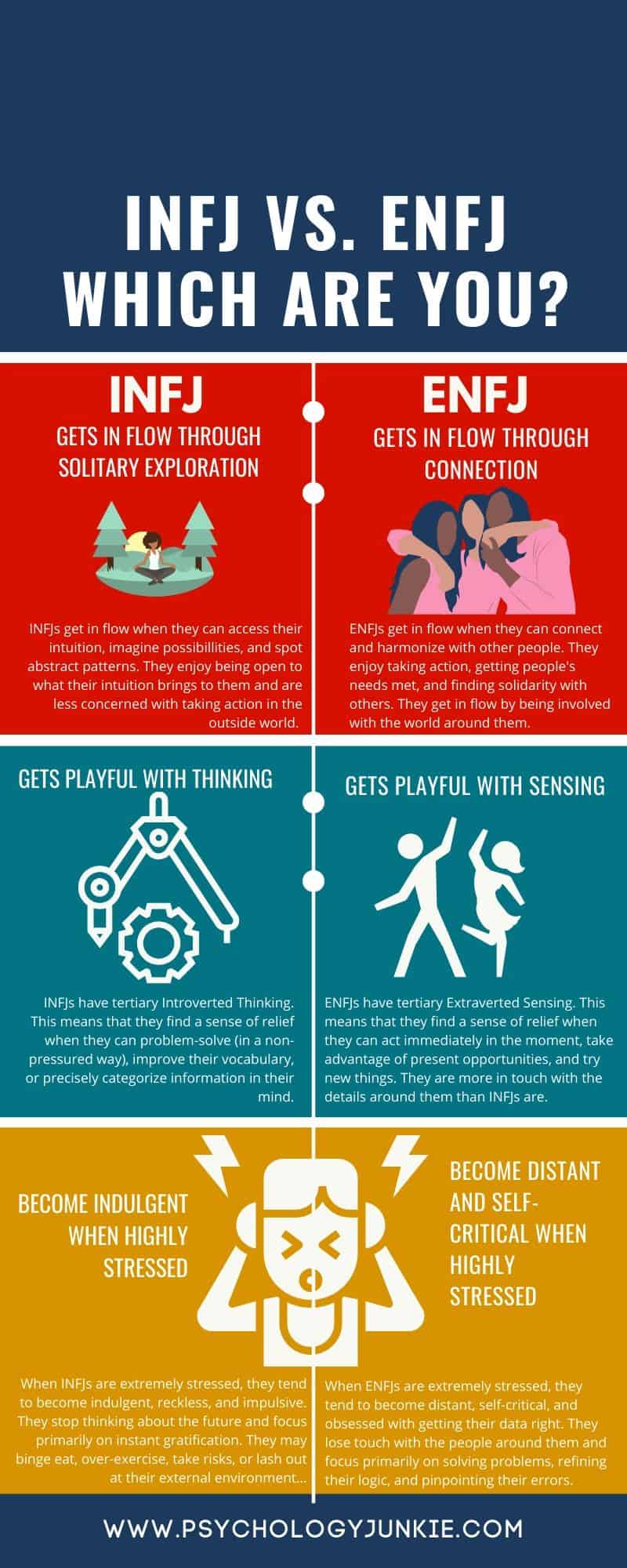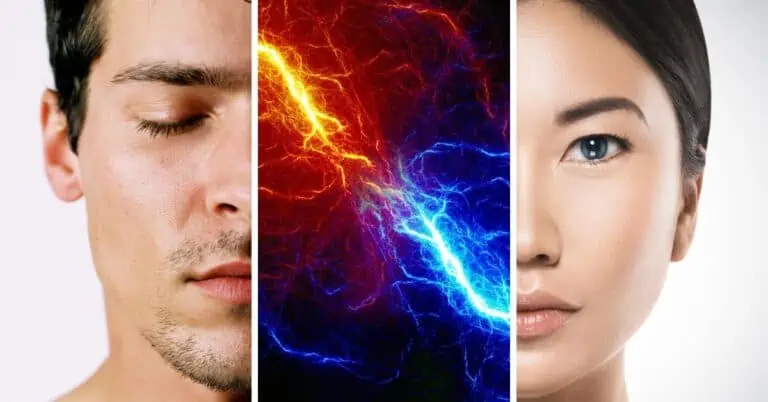INFJ vs. ENFJ – What’s the Difference?
INFJ vs ENFJ: Which one do you relate to the most? Maybe you’ve taken several personality tests online and you’ve received both ENFJ and INFJ results, or maybe you’re just curious about how to tell the difference between the two types.
If you’re just looking at the names of these two types, you might think the only difference is that one is extroverted and the other’s introverted. That’s only partly true. To really get into what makes these types different, we need to look at how they use cognitive functions. If you’re not familiar with cognitive functions, you can check out my post “The Simplest Guide to Myers-Briggs® Functions Ever” and Susan’s post “The Cognitive Functions – What Are They?” for an overview of how that all works.

Each type has four cognitive functions that are their favorites. For INFJ and ENFJs, these four functions are exactly the same. The two types just use the functions in a different order of preference, and that can make quite a big difference.
Not sure what your personality type is? Take our new personality questionnaire here. Or you can take the official MBTI® here.
ENFJs and INFJs prioritize the world differently
The primary function of INFJs is an introverted one. These types see the inner world as the one that’s most “real” and find that spending time there is energizing. INFJs tend to approach life from a thoughtful, introspective place. Isabel Myers said that introverts “Cannot live life until they understand it.” Like other introverts, INFJs make sense of the outer world by first looking inside themselves.
For ENFJs, their primary function is extroverted. The outer world is what captures the bulk of their attention. They to approach life from an open, more experience-focused place. Isabel Myers said extroverts, “Cannot understand life until they have lived it.” They make sense of the inner world by first looking outside of themselves.
Just looking at introvert-extrovert differences isn’t enough to tell these two types apart. INFJs are often considered an “extroverted introvert” because many enjoy spending time with people. Thanks to Extraverted Feeling (their auxiliary cognitive function), INFJs can be friendly, engaging, and warm, and so some people might think they’re extroverts. Similarly, ENFJs are often called “introverted extroverts” because they need and enjoy occasional solitude.
ENFJs and INFJs lead with very different functions
Introversion and Extroversion aren’t the only things going on with someone’s favorite function. For INFJs this function is also intuitive (Introverted Intuition). For ENFJs, their favorite function is a feeling one (Extroverted Feeling).
An INFJ will typically find that their Intuitive side is the one that feels most comfortable. Pattern-recognition, big-picture thinking, and seeing things from multiple perspectives come naturally to them. Most INFJs place a higher value on experiencing and understanding life than on controlling it. Even though there is a “J” in their personality type, Intuition is a Perceiving function (what we use to learn new information) and so INFJs might find that they identify a little more with perceiving traits than judging traits.
An ENFJ will typically find that their Feeling side is the one that is most comfortable. Reading other people, picking up on and meeting their needs, and interacting with them in ways that keep everyone happy come naturally to an ENFJ. They probably place a higher value on having things settled and decided than on experiencing life as it happens. Feeling is a Judging function (what we use to make decisions), and so ENFJs tend to identify well with judging traits and like having their outer world ordered and controlled.
The co-pilot is different for ENFJs and INFJs
INFJs and ENFJs both have the same two functions as the ones they use most comfortably. The only difference is which function is their preferred process and which one is used as the co-pilot process. We’ve already looked at their dominant functions, so now it’s time for the co-pilot.
INFJs support their Introverted Intuition with auxiliary Extroverted Feeling. They use this function most when making decisions and relating to other people. It helps them figure out how social groups work and make decisions that will meet everyone’s needs. It’s the part of them that asks, “How will this make people feel?” or “How are people currently feeling?”
ENFJs support their Extroverted Feeling with Introverted Intuition. This side of their personality helps them learn and process information. They use it to put patterns together and look at something from a new perspective. This is the part of them that asks, “What else is going on here?” or “What’s the pattern?”
ENFJs and INFJs behave differently when in a “loop”
At this point, you might be thinking it’s near impossible to tell INFJs and ENFJs apart. Since both use Introverted Intuition and Extroverted Feeling as their favorite functions, how on earth are we supposed to tell which one someone is using as their primary process and which one as their auxiliary? This is where looking at tertiary functions can help.
INFJs have Introverted Thinking as their tertiary. They may feel pretty comfortable using this function since it is introverted, like their favorite function of Introverted Intuition. When they by-pass their Extroverted Feeling and get into a “loop” between their two introverted functions, INFJs become more analytical, research-minded, and focused on trying to organize things logically. If they spend too much time in this loop an INFJ may lose touch with their more diplomatic, relational side. This can lead to withdrawing from people and becoming more critical and defensive.
ENFJs have Extroverted Sensing as their Tertiary. It’s extroverted, just like their favorite function of Extroverted Feeling. When ENFJs get into a “loop,” they become more interested in sensory experiences and may become easily distracted by details in the outer world. If they spend too much time in the loop, an ENFJ might become impulsive, overly self-indulgent, distracted from their long-term goals, and overly preoccupied with how others see them.
Stress affects ENFJs and INFJs very differently
The inferior function (the lowest on a four-function stack) typically shows up when we’re stressed. We can also use it when relaxing and it often shows up in our favorite hobbies. It can provide some excellent clues when we’re trying to figure out which type someone is.
An INFJ has Extroverted Sensing as their inferior function. Stress tends to make them obsessively focused on external data. They often overindulge in sensory pleasures like food, drinking, shopping, etc. Stressed INFJs can also develop a suspicious, hostile attitude toward the outer world. When they’re using this function in a healthy way, INFJs often find they enjoy activities that require sensory engagement like gardening, cooking, or yoga.
An ENFJ has Introverted Thinking as their inferior function. When stressed-out, they tend to become excessively critical of themselves and of others. They may start using convoluted logic to try and solve problems without involving other people, often feeling a compulsive need to take action. If they’re using this function in a healthy way, ENFJs might find that they really enjoy activities that require analytical reasoning like strategy games or working with computers.
In conclusion …
I hope this post has helped you make sense of the differences and similarities between ENFJ and INFJ types. Most people don’t fit every single description of their personality type 100%, but we do have a “best fit” type that does a good job of describing how we think. Here’s an infographic that can help you to further visualize the differences between these two personality types:

About the Author:

Marissa Baker is the author of The INFJ Handbook (available in the Amazon Kindle Store). You can find her online at LikeAnAnchor.com where she blogs about personal growth and development from a Christian perspective.
More Resources from Psychology Junkie:
Find out more about your personality type in our eBooks, Discovering You: Unlocking the Power of Personality Type, The INFP – Understanding the Dreamer, or The INFJ – Understanding the Mystic.









Thank you for writing this! My sister and I are INFj and ENFj, respectively, and it is always interesting to learn how we are different. This was very fun and helpful!
I’m so glad that you enjoyed this Louisa! Thank you!!
As I am censored… You cause confusion in people. You also confuse the abstract cognitive process with a taste for abstraction. After X years, shame on you. Really.
I’m sorry. I’m kind of confused with what you’re saying here?
You have written so well explaining the difference so clearly. Thumps up Marissa!
Is it possible to be Infj and Enfj? Both fits extremely. I couldn’t tell which fits more.. I just made the test online and got the Enfj result but everything I read about Infj’s fits 100%, too.
Personality is fluid and there is no set personality that you can be strictly defined as. So, there can be a possibility you could be both.
Thank you for the post, very informative! I am still confused, though; I have taken the test multiple times and depending on how I feel and think about things in general when I take it, I consistently go back and forth between INFJ and ENFJ. Out of everything you listed here, the only thing I think stood out as more than the other was playful thinking vs. playful sensing. I typically would get more playful with no-pressure problem-solving than with impulsive actions; and though I do like trying new things, I typically like to think things through beforehand and be prepared. But in every other category it really depends on the week. Is it possible to be both? Or does that make me more of an INFJ? Thanks!
P.S. I also keep hearing that INFJs are more concerned with big-picture patterns and themes and less concerned with analyzing the people around them, and that the opposite is true for ENFJs. I definitely like understanding how things work behind the scenes, but I think on a whole I love trying to understand and observe the people around me more than the big-picture themes if that makes sense. Sorry, I have a lot of questions. If you reply, I really appreciate it!
Appreciate. I have an friend who thought that he is INTJ, and now, he thinks he is INFJ! Actually I am INFJ and wondered how could it’s been possible? Because I saw many differences and mutual things, now I understand whats the difference. I dubbed he is ENFJ, and it’s true! Thank you, snd I am so sorry my English is terrible. 😉